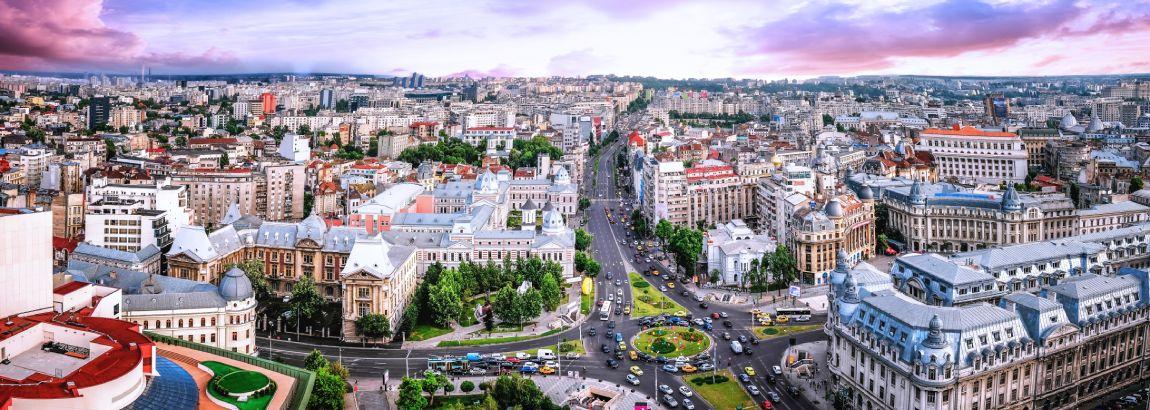
| City - Airport | Arrival: | ||
| Iasi | Chisinau | ||
| from Hong Kong (HKG) | HKG → IAS | HKG → RMO | |
| - International (HKG) | HKG → IAS | HKG → RMO | |
More than 1.8 million people live in Bucharest and its suburbs. It is believed that Bucharest, like Rome, was built on seven hills. Although Bucharest is home to about 9% of Romania's population, it produces about 21% of the country's gross domestic product. A quarter of the industrial production of Romania is concentrated in Bucharest, this is the most industrialized part of the country. Bucharest was first mentioned in documents in 1459. It became the capital of Romania in 1862 and is the centre of Romanian media, culture, and art. Its architecture is a mix of historical (neo-classical), interbellum (Bauhaus and art deco), communist-era and modern. It is located in the southeast of the country, on the banks of the Dâmbovița River,
an architectural monument in the capital of Romania, Bucharest, built during the times of the Socialist Republic of Romania. The palace is considered the largest civil administrative building in Europe, the largest parliament building, and the heaviest administrative building in the world. The palace has 1100 rooms, 12 floors. 4 underground levels have been completed and are already in use, and 4 more levels are in various stages of completion.
concert hall in the center of Bucharest. One of the main landmarks of the Romanian capital. Now the main concert hall of the city, the venue for the annual international music festival. Since 1889 it has been the main concert venue of the George Enescu Bucharest Philharmonic Orchestra.
a large park in the north of Bucharest, located around the lake of the same name, was founded in 1936. It is located near Charles de Gaulle Square and the Arc de Triomphe, on the Boulevard "King Mihai I" street. It includes two parts: one is occupied by the Village Museum, the other is a public recreational area.
the largest museum of fine arts in Romania. It is located in Bucharest on the Revolution Square in the building of the former royal palace. The museum's collections include Romanian and foreign art, totaling about 60,000 items, including about 3,000 pieces of European art.
was founded in 1860, located in Bucharest in the Cotroceni district. Named in memory of the founder, Dimitrie Bryndza. The Botanical Garden covers an area of 17.5 hectares with a greenhouse of 4 thousand square meters. m., contains about 10 thousand species of plants.
Monastery of the Romanian Orthodox Church in Bucharest. It stands on the hill of the same name in the very center of the Romanian capital. The monastery was founded by Alexander II and his wife Catherine in gratitude for the victory in the battle. His son, Mikhne II, endowed the monastery with estates, villages and relics, increasing its prestige in Wallachia. During his reign, the first library in Bucharest was founded in the monastery.
A popular wellness center with mineral pools, water slides, saunas and an indoor botanical garden. The Baths of Bucharest opened in 2016, immediately becoming the main point of attraction for the Romanian capital. The baths are divided into three zones: the Galaxy amusement park, The Palm and Elysium relaxation area with saunas. Outside are Sands of Therme, a vast artificial beach.
a palace and park ensemble built by the Wallachian ruler Konstantin Brynkoveanu 10 km from Bucharest in 1698-1702. An example of the Brynkovian style of architecture, saturated with Venetian, Dalmatian and Ottoman reminiscences. The Wallachian ruler Constantin Brancoveanu became not only the actual founder of Romania, but also the creator of a unique style. Formed under the influence of the architecture of Northern Italy and the Ottoman Empire, the style was distinguished by an abundance of carved architectural decorations, decorative paintings, verandas, loggias, etc.
a forked, yellow glass-covered arcaded street in the center of Bucharest. It was designed by the architect Felix Xenopol and opened in 1891. Today, it has several indoor and outdoor restaurants, including an Egyptian-style bar/restaurant, Blues Café, a bistro, a Chinese restaurant, and a wine bar.
arch in the northern part of the capital of Romania - Bucharest. It is located between the Kiseleva highway and the Korol Mihai I boulevard. The first wooden Arc de Triomphe in Bucharest was erected in honor of Romanian independence in 1878 so that victorious troops could pass under it. The next arch, with a concrete base, plaster sculptures and decor, was built on the same site after the end of the First World War in 1922.
Airports:
Airports: